The best CPU for gaming 2025: Processing power unleashed
Stay ahead of the curve with the best CPUs for gaming
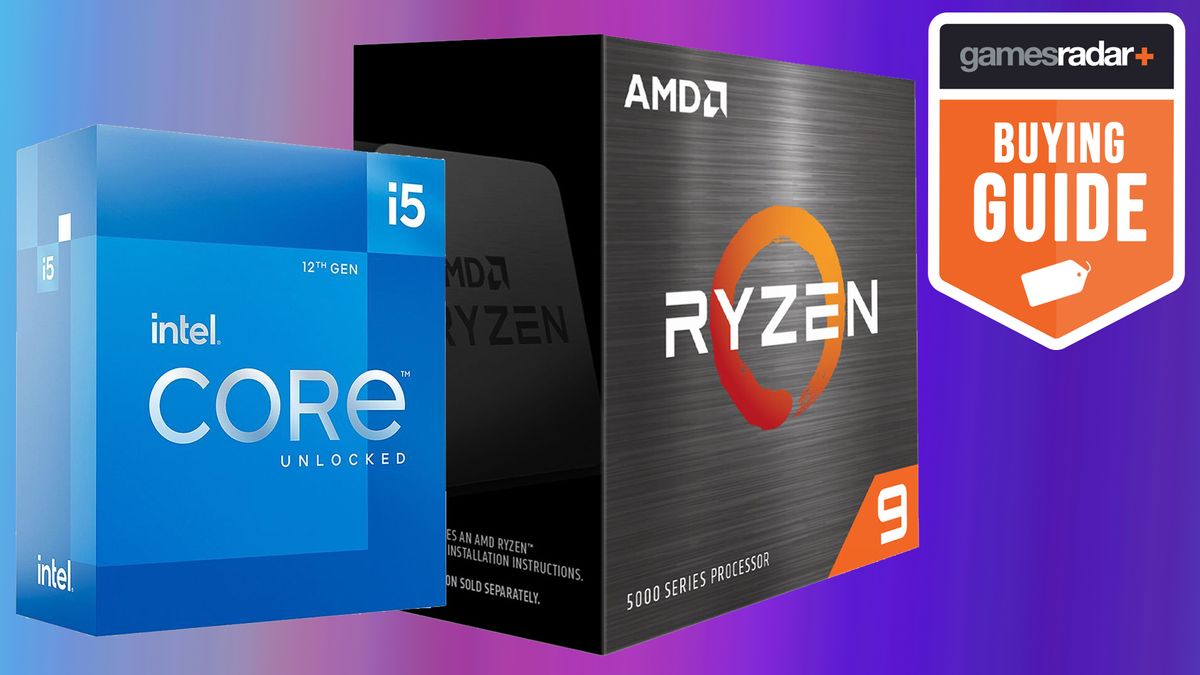
What is the best CPU for gaming? Great question, and just to be annoying, I'm going to say that depending on you, your gaming aspirations, and your budget, the answer will be totally unique. Sure, you can opt for the one everyone on Reddit is raving about with a million cores, a 3D V-cache, and a ridiculous max boost clock speed, but it'll set you back way more than you actually need to spend to fulfill your requirements.
The architecture of modern chips has come a long way, so much so that "mid-range" isn't what it used to be on the Intel or AMD side. That means that if you want something that will keep up with the very best gaming PCs, you don't need to look far, and even Intel's last-gen chips will likely be enough for you because of the move to DDR5 technology. The chips on the list below will do you just fine, and most importantly, won't break the bank.
For the vast majority of PC gamers, a 12th-generation Intel Core i5 CPU or AMD Ryzen 5 7000 CPU will do the trick, but you'll need to be doubly sure you've got the right motherboard socket for whatever CPU you go for. For example, AMD CPUs can't be used for Intel motherboards, and the same goes for the other way around. DDR5 processors won't fit on an older motherboard either, so you really need to plan these things out thoroughly to make sure you don't burn a hole in your pocket for parts you can't actually use.
The Quick List
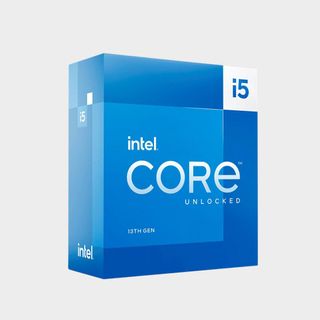
The best CPU for gaming overall
You can absolutely find better specs on this list and off of it, but the Intel Core i5-13600K packs in all the value, 4K potential, and up-to-date features most players need at a reasonable price.
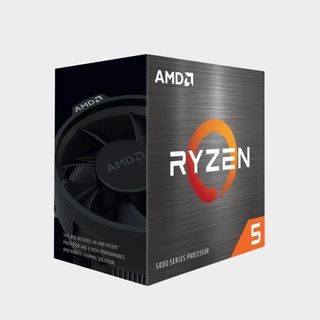
The best budget CPU for gaming
Using this processor will mean you're locked to a DDR4 motherboard, but if you're building on a strict budget you'll be shocked at the solid performance this can give you in 2025.
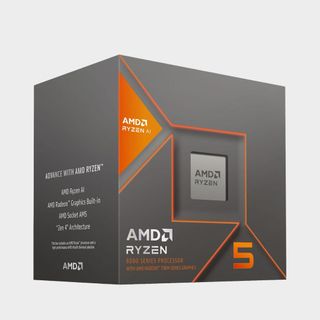
The best value DDR5 processor
If you want an up-to-date DDR5 chip that can handle gaming at 4K, you'll be shocked at the value for money AMD gives you in its 8600G processor. This trounced my expectations.
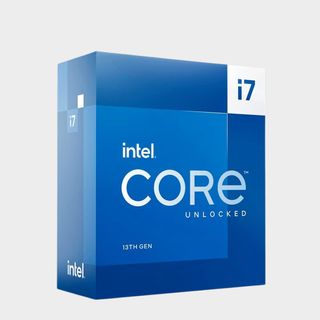
The best Intel CPU for content creators
AMD has the content creation market under its thumb thanks to its fancy 3D V-cache technology, but if you've got an Intel motherboard, the 13700K is the chip we'd recommend to you.
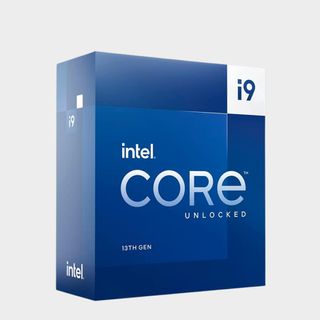
The best Intel flagship CPU
Intel hasn't had the best couple of years when touting its flagship processors. The 13900K was the last one that truly blew us away, and since it's cheaper than the newer models, it's what we recommend.
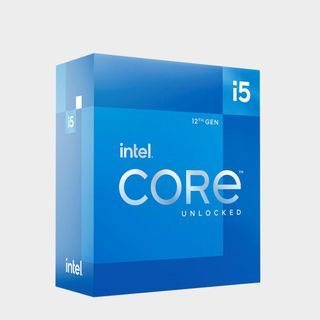
The best budget DDR5
AMD's Ryzen 5-8600G will outperform this chip, but Intel's 12600K is the perfect entry point into the DDR5 world, and it's frequently found on offer at the majority of retailers out there.
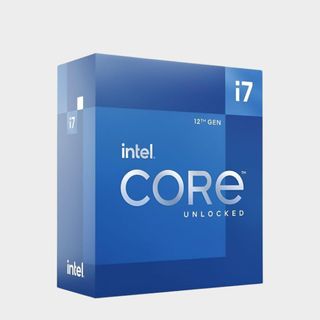
The best 12 Core CPU for gaming
For many people, 12 cores is the sweet spot these days, and for me, this category of CPU is all about price-to-performance. Without straying into expensive AMD territory, this is the best 12-core option we've tested.
The best CPU for gaming overall





Specifications
Reasons to buy
Reasons to avoid
The Raptor Lake Intel Core i5 processor is an absolute powerhouse that should really make us question what we deem a mid-range CPU to be these days. Packed with 6 performance cores, 6 efficiency cores, and 20 threads, on paper this is essentially a cheaper and more efficient 12th Gen i7.
In gaming, benchmarking, and content creation, this CPU barely broke a sweat, and doing both at the same time barely used up to 15% of the CPU's capacity. That's so efficient that I thought there was something going wrong during testing, because an i5 definitely isn't expected to be this powerful.
If there are any flaws to note here, it might be that there's no turbo max 3.0 here - that's reserved for 13th gen i7 and i9 processors. Like the others in the Raptor Lake bunch, this CPU can be a tad more power hungry than you might like, and it can run hot under stress. Rest assured though, the i5 gives you the best all round package in these regards, and won't be nearly as extreme as an i7 or i9.
When you take price-to-performance into account, there really isn't any beating this CPU without moving to the AMD side. For the absolute majority of players, money shouldn't be wasted. An Intel Core i5-13600K is all you'll need for gaming this generation.
The best budget CPU for gaming
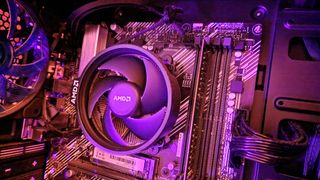
2. AMD Ryzen 5 5600x
Specifications
Reasons to buy
Reasons to avoid
The AMD Ryzen 5600X may not blow anyone away with its sheer power, especially with AMD's 7000 series on the shelves now. But as far as AM4's last-generation chipsets from the company go, it's very hard to beat in terms of price. What's more, the 5600X is frequently on sale, down from its already competitive $260 MSRP.
The AMD Ryzen 5600X is a solid all-around performer with both its single-core and multi-core capabilities in-game, too. That's due in part to this CPU's higher-than-average clock speed combined with its quiet-yet-cool operation over extended periods of time. If you're after a processor to keep your rig ticking over at its best, then the 5600X continues to impress across the board.
The best value DDR5 CPU







Specifications
Reasons to buy
Reasons to avoid
AMD Ryzen chips are known for their phenomenal value, and if there are any builders on a budget looking for a DDR5-compatible CPU that can handle gaming and content creation in 4K, this is the one we recommend. It's available both with and without an AI-oriented NPU, and if you opt for the version without, you get a slightly slower clock speed but pay even less money.
Six cores and 12 threads may not seem like an awful lot for a modern-generation of processor, but such is the power and efficiency of AMD's Zen 4 architecture. You get less architecturally than you do if you opt for an Intel Core i5-13600K, but you get bang-on equivalent clock speeds and gaming performance, which is very impressive.
Using this CPU for our benchmark tests, I was pleasantly surprised by the results when I was gaming in 4K. Single and Multicore performance in the likes of Cinebench and Blender weren't quite as strong as in Intel's corner, which maybe speaks to how this processor is less viable for content creators. Still, if it's just some gaming in 4K you're after, this is surprisingly capable. Playing Planet Zoo, Homeworld 3, and Cities Skylines, I was able to get 4K60 out of this processor, which is very impressive for something of this price.
There's great value to be had here because we've seen how well supported AMD's 5000 series platform has been since 2016 (it's still seeing new additions to the lineup today), and that makes us confident that if you opt for a CPU and motherboard like this for your DDR5 machine, you'll likely get years of upgrades and support for your money.
The best Intel CPU for content creators






Specifications
Reasons to buy
Reasons to avoid
Before there was a Raptor Lake Refreshed Intel Core i7, there was a Raptor Lake Intel Core i7. While we're just about to start testing the 14th gen version of this processor, at this point in time, it's hard not to recommend the 13th gen model. It'll likely start to get cheaper now there's a new wave of Intel chips, and the performance it nets you is no short of ridiculous.
The 13700K has 16 cores - only two more than the i5. These are made up of 8 performance cores and 8 efficiency cores. In terms of threads running through these cores, you have 24 - four more than the i5. So the real question remains - do you actually need this extra headroom for the money? For most people, we'd still recommend the 13th Gen i5, but for content creators looking for that extra piece of mind, that extra headroom does make a difference when gaming at higher resolutions and settings.
For a full rundown of how benchmarking scores differ between the two, take a look at our reviews. For now, we'll say that if you're willing to spend that extra $100 or so, you'll get an increase in performance, but just be prepared to work harder when keeping this CPU cool. Similarly, check out the price of the latest AMD Ryzen 7, because the rival version will almost always be found cheaper.
Regardless, this is i9 power in a chip with i7 branding. If you need extra headroom for content creation tasks like live streaming and video editing, you can't go wrong with the 13700K.
The best Intel flagship CPU




Specifications
Reasons to buy
Reasons to avoid
Intel's 13th Gen flagship CPU is a powerhouse that few will need, but if you're going to go for a top-of-the-range processor from the last few years, this is the sweet spot. Yes, the 14th Gen Core Ultra equivalent will likely give you better performance, but this is the one you'll get better value from in terms of price. The specs separating the latest model are few, so you really are getting the best deal with the Raptor Lake version.
This i9 sports a whopping 24 cores and 32 threads, which is enough to make even the busiest of workloads weep. With that amount of headroom, there just isn't anything that'll make this CPU struggle - in gaming, content creation, or anything else you have in mind. We've seen the sorts of performances that come from the lesser i7 and i5 in the Raptor Lake wave, and they were plenty for most gamers to get by on. If our review of this flagship is anything to go by, nothing will stop you with this i9 house in your rig.
One of the biggest concerns we had with this chip was that it would be unruly in its temperature management. With the right AIO in your system though, we actually found very passable results. While providing the best benchmarking scores of any CPU we've tested until now, it remained below 66°C, which is very impressive for a generation of processors that are known to run hot.
Again, let us stress that this processor is overkill for the majority of people. For most gamers, an i5 or i7 in the 13th Generation will get you by easily. For the enthusiast, however, there's no beating this right now.
The best budget Intel CPU

6. Intel Core i5-12600K
Specifications
Reasons to buy
Reasons to avoid
The 12th generation Intel i5 Alder Lake processor does what people were expecting from Rocket Lake - and actually dethrones AMD Ryzen 5000 series for a competitive price-to-performance ratio that's hard to argue against.
Comparing the Intel Core i5-12600K with the less-than-well-received Intel Core i9-11900K, the 12600K actually outperforms it for a fraction of the cost. Indeed, its documented performance means it more than deserves a high spot in our roundup but misses out on that top slot for one simple reason: the 13600K is unreal.
Regardless, one of our editors has this as their CPU of choice, and it's handled gaming and benchmarking with an RTX 4090 with absolute ease. If you like the look and feel of the 13600K but don't wanna splash out as much dough, this isn't too far behind.
The best 12-core CPU for gaming
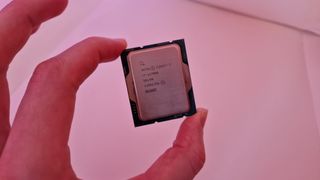
9. Intel Core i7-12700K
Specifications
Reasons to buy
Reasons to avoid
The Intel Core i7-12700K was our testing rig's processor of choice for a time, and it still has a place on this list because it lies in a 12-core category and manages to stand out after all this time. 12 cores is a sweet spot for many gamers today, particularly those upgrading their rigs after a long time. AMD has a few options in this category, but they're now more expensive than the 12700K.
With DDR5 compatibility on the Intel side, you don't have many 12-core options to choose from, particularly because the 13th generation really upped the ante when it comes to core and threat numbers.
We used this processor to test some serious GPU power, including the AMD Radeon RX 7900 XTX, and so many RAM kits. It never failed us and offered excellent power for 4K gaming. As the price of this chip continues to drop, you're going to get loads of value from it. That said, if you can afford more, the 13th gen equivalent should be more tempting to you.
Best CPU for gaming: FAQs
What CPU is best for gaming right now?
In our opinion, the best CPU for gaming right now is the 13th Gen Intel Core i5-13600K. On paper, it's a slightly better 12th Gen i7, but it's a lot cheaper. Don't be put off by the fact higher tier processors exist, an i5 like this is an absolute powerhouse, and it'll save you money you can put into other expensive next-gen components.
What CPU do pro gamers use?
While we can't speak for everyone, E-Sports athletes and streamers will likely use the best of the best, highest-end components they can get their hands on to optimize everything about their performance. Particularly streaming will put a lot of strain on hardware if it's being done from the same PC that's running a game, so the most powerful CPU and GPU imaginable are necessary if content creators want their footage to look good. Most likely, we'd bet that professional gamers (the type that are draped from head to toe in RGB lighting at all times), will use 13th Gen Intel Core i9 or the most up-to-date Ryzen 9 CPUs.
Do you need a powerful CPU for gaming?
Thanks to modern processor architecture, you may not need as "powerful" a CPU as you think. Ryzen 5 and i5 chips are equivalent to the i9 CPUs from even a few years ago. While you'll still be able to play most games with a CPU that's a few years old, it can benefit you to pair your computer's brain depending on the GPU you use. Even folks with an RTX 4090 don't need an i9 to work with it. The best CPU for gaming for most people doesn't require you to spend that much these days.
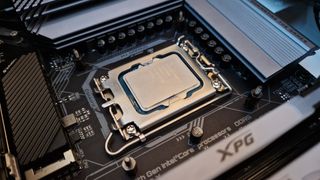
What is the strongest CPU?
When it comes to the best CPU for gaming, content creation, or whatever other demanding tasks you might have for it, you're spoiled for choice these days. There's excellent value to be had with the AMD Ryzen 7000 series, especially the ones with X3D in their names, since they've been bred with unreal performance in mind. On paper, the Ryzen 9 in that family takes the cake. But the 13th Gen i9 also packs some outrageous power if you can afford it.
What is the best CPU type for gaming?
If you're wondering which brand does it better, that's a hard question to answer. We've rounded up the best CPUs for gaming from both Intel and AMD, and depending on your preferences, and maybe the rest of your rig, one or the other might be better suited for you individually. Intel may have the edge on popularity, but AMD has come a long way to combat that in recent years.
For the majority of people, a 12th Gen Intel Core i5, or an AMD Ryzen 5 or 7 will be more than enough for gaming. If you're a streamer, or someone who spends a lot of time doing multimedia production, a higher-end CPU might be advantageous.
Now you've got one of the best chipsets available for the money, keep your rig in top tier shape with the best gaming keyboard and best gaming monitor on the market, too.
Sign up to the GamesRadar+ Newsletter
Weekly digests, tales from the communities you love, and more
One of my earliest memories is playing SuperMario64 and wondering why the controller I held had three grips, but I only had two hands. Ever since I've been in love with video games and their technology. After graduating from Edinburgh Napier University with a degree in Journalism, I contributed to the Scottish Games Network and completed an Editorial Internship at Expert Reviews. Over the last decade, I’ve been managing my own YouTube channel about my love of games too. These days, I'm one of the resident hardware nerds at GamesRadar+, and I take the lead on our coverage of gaming PCs, VR, controllers, gaming chairs, and content creation gear. Now, I better stop myself here before I get talking about my favourite games like HUNT: Showdown, Dishonored, and Towerfall Ascension. Location: UK Remote
- Phil HaytonHardware Editor
Most Popular


